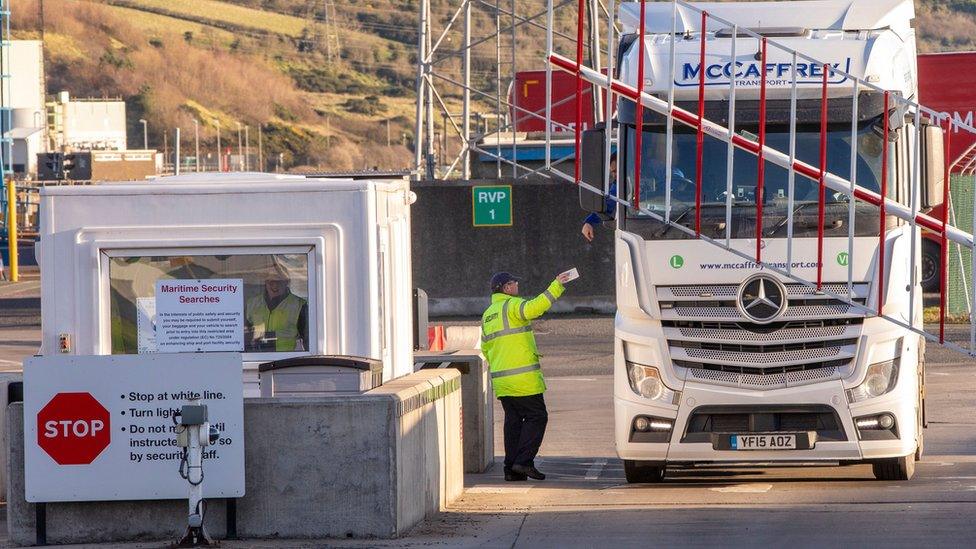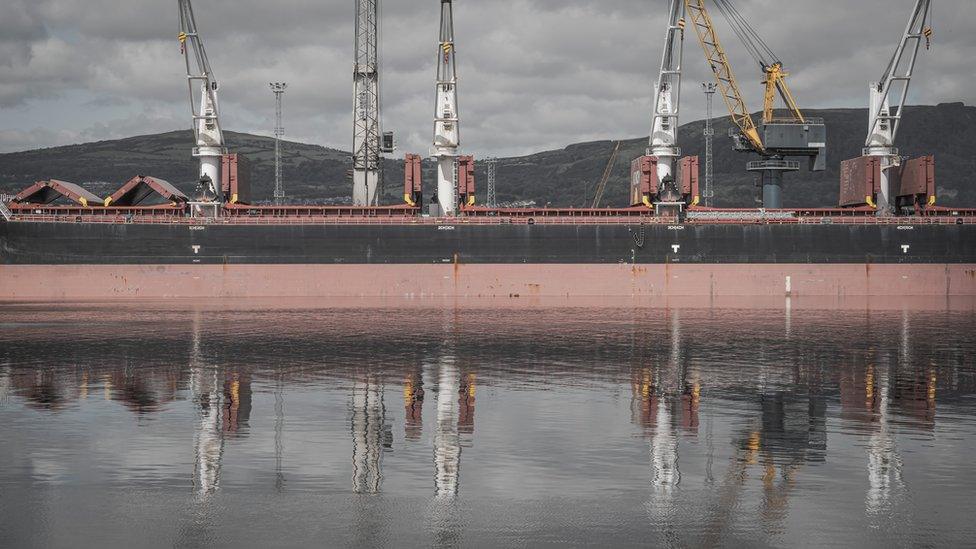Northern Ireland: Could the EU and UK face a trade war?
- Published
- comments

An escalating dispute over the post-Brexit trading arrangements for Northern Ireland risks seeing the government scrapping parts of that deal. In that event, could it trigger a trade war that could see households and businesses paying an unwelcome price?
European Union officials have repeatedly warned of "serious" consequences if the UK were to override part of the Northern Ireland Protocol.
Last November, Ireland's minister for foreign affairs, Simon Coveney, warned that the entire Trade and Co-operation Agreement (TCA) - which exists to ensure tariff-free and quota-free trade between the EU and UK - depends on the UK observing the Protocol.
More recently, however, as the war in Ukraine has both heightened cost-of-living issues and co-operation between the EU and UK, Mr Coveney has struck a more conciliatory tone, saying the EU first wants to seek solutions. But he warned that any unilateral action by the UK could spell "a very difficult summer".
And ultimately, it means there is a risk that part, or all of the TCA could be scrapped by the EU unilaterally - albeit not quickly. That would allow the EU to impose tariffs on British-made goods.
In most cases, such action requires notice of up to a year, and an intervening arbitration process.
The EU has scope to pull some other levers in the meantime, perhaps restricting UK fishing vessels entering EU waters for example.
Brussels has already been investigating interim measures, after claiming that British action to delay border formalities last year breached the Protocol. It later paused that process after agreeing to negotiations - but it could decide to resume.
And the fallout of such action could be painful.
Economists warn that the EU could, as has happened in trade disputes with the US, target politically-sensitive products for tariffs to maximise the impact - salmon from Scotland, for example.
A total of £372m worth of Scottish salmon went to the EU last year, supporting thousands of jobs.
Alternatively, the EU could focus action on industries located in the so-called Red Wall seats, in parts of north-east England and the Midlands that shifted from Labour to the Conservatives at the last election. Some of these areas are disproportionately reliant on custom from the bloc.

If all UK-made goods were to face the same tariffs as those sourced from other countries outside the EU, then agricultural goods could face a typical levy of 10% - with dairy items attracting as much as 35% - when sold to the bloc.
But any tariffs imposed on British goods would spell higher bills for European customers - something they wouldn't thank Brussels for.
That, as well as the requirement that any response has to be "proportionate", has most economists thinking that any such action would be selective.
The EU could ramp up red tape to make life harder for companies trying to sell into its market. As it is, three-quarters of exporters in the North East say that post-Brexit formalities make it more challenging to sell to the EU, according to a Chamber of Commerce survey, with export levels down by more than a tenth compared with 2019.
The UK might theoretically react to any retaliation by imposing tariffs of its own. Such a levy would make it even harder for European producers to compete in the UK; they've already seen their sales here slip since Brexit, and exports from the likes of Germany are already poised to go into reverse.
But that's an option that Britain has so far played down - after all, it could in theory see extra charges on European-made cars and higher prices for staples, at a point when UK households are already buckling under the strain of higher bills.
As it is, economists at the London School of Economics say that changes in the run-up to Brexit and afterwards saw the price of food imported from the EU rise by 6% across 2020 and 2021.
An all-out trade war could inflict a mutually crippling blow when the economies of the EU and UK are already highly vulnerable. The Brexit Opportunities Minister, Jacob Rees-Mogg, has described such an eventuality as an "act of self harm", perhaps gambling that the EU won't take that risk
Alternatively, Brussels could decide that starting the process of retaliation is required for leverage and to push the UK to concede in settling the dispute over Northern Ireland.
Almost five years after the referendum, the wrangling over how Brexit should work is far from over.
- Published2 February 2024
